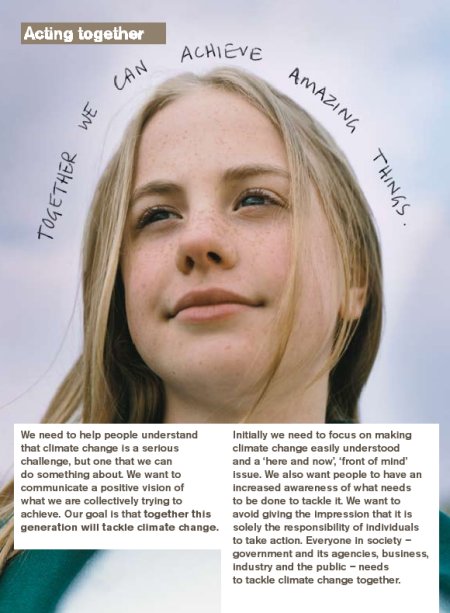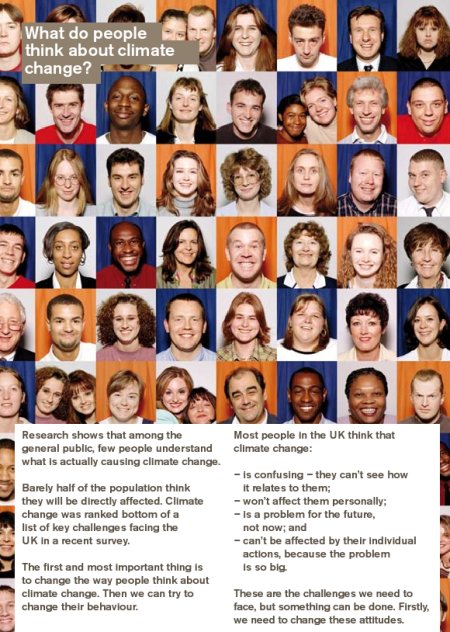Together we can achieve amazing things


images are from the defra campaign about climate change
This is a follow-up to my recent WYSIWYG versus WYChYWYG post in which I tried to explain that I think it is important to enforce communication about the climate change.
The institute for public policy research (IPPR) published recently a study called: warm words, which reflects also on how to communicate the climate change and how to possibly achieve behaviour change.
There are three groups of climate change repertoires in the UK. There is an ‘alarmist’ repertoire, which is fundamentally pessimistic and is in a category of its own, as well as two groups of ‘optimistic’ repertoires one that includes repertoires that assume ‘it’ll be alright’ and a more pragmatic set of repertoires that assume ‘it’ll be alright as long as we do something’. (p.7)
To help address the chaotic nature of the climate change discourse in the UK today, interested agencies now need to treat the argument as having been won, at least for popular communications. This means simply behaving as if climate change exists and is real, and that individual actions are effective. The ‘facts’ need to be treated as being so taken-for-granted that they need not be spoken
The disparity of scale between the enormity of climate change and small individual actions should be dealt with by actually harnessing this disparity. Myth (which can reconcile seemingly irreconcilable cultural truths) can be used to inject the discourse with the energy it currently lacks.
Opposing the enormous forces of climate change requires an effort that is superhuman or heroic. The cultural norms (what we normally expect to be true) are that heroes the ones who act, are powerful and carry out great deeds are extraordinary, while ordinary mortals either do nothing or do bad things. The mythical position the one that occupies the seemingly impossible space is that of ‘ordinary hero’.
As an example they refer to the above Defra Campaign (see also website):
Together we can achieve amazing things’, Defra, 2006 This statement, which forms part of the ‘Acting Together’ section of the climate change initiative guide is an ‘ordinary heroism’ statement. (p.27)
Some more propositions from the paper:
More generally, the challenge is to make climate-friendly behaviours feel normal, natural, right and ‘ours’ to large numbers of people who are currently unengaged, and on whose emotional radar the issue does not figure. The answer is not to try to change their radar but to change the issue, so it becomes something they willingly pick up, because it means something valuable in their own terms.
…
Ultimately, positive climate behaviours need to be approached in the same way as marketeers approach acts of buying and consuming.(p.8)
->blog entry on real climate (a blog by climate scientists) about the paper, some citations from it:
I think that we would concur that the more excited style of journalism (which is not universal by any means) doesn’t help foster understanding – but it can raise interest.
…
This lack of serious discussion about solutions may however be changing if these recent MIT Technology Review or Energy Journal (subscription) special issues are anything to go by, and as more people and institutions start to think about the problem. This was always going to be the hard part though.